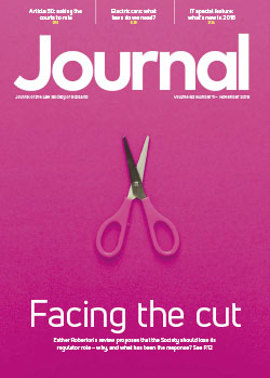Sending the right message
“Bread from Asher shall be rich, and he shall yield royal dainties” (Genesis 49:20)
“As enshrined in Article 9, freedom of thought, conscience and religion is one of the foundations of a ‘democratic society’ within the meaning of the Convention. It is, in its religious dimension, one of the most vital elements that go to make up the identity of believers and their conception of life, but it is also a precious asset for atheists, agnostics, sceptics and the unconcerned. The pluralism indissociable from a democratic society, which has been dearly won over the centuries, depends on it.” (Kokkinakis v Greece (1993) 17 EHRR 397)
Or, “one is free both to believe and not to believe”, as Lady Hale put it in Lee v Ashers Baking Co [2018] UKSC 49 (10 October 2018).
The media attention which surrounded the case was such that the facts will be well known. In short, Lee, a gay man, placed an order for a cake iced with the message “Support gay marriage”; the bakery refused because of the sincere religious beliefs of its owners that gay marriage is inconsistent with biblical teaching. On appeal from the Northern Irish Court of Appeal, the Supreme Court required to answer the questions whether the refusal to supply the cake to Lee was unlawful discrimination on grounds of sexual orientation, and/or political opinion or religious belief. If the prima facie answer to either question was “yes”, consideration had to be given to the bakers’ articles 9 and 10 rights (freedom of religion and freedom of expression) and what difference, if any, those rights make.
The courts below held that the bakery’s refusal amounted to discrimination; the Supreme Court disagreed and unanimously allowed the appeal. A significant amount of discussion in the case is taken up with the specifics of the equality regime in Northern Ireland (which is not the same as under the Equality Act 2010 in Great Britain). However, the broader points are, in Lady Hale’s words, “undoubtedly of general public importance, not only in Northern Ireland but also in the rest of the United Kingdom”.
The sexual orientation claim
The bakers’ principal argument throughout was that their objection was to the message, not to Lee, that anyone who wanted that message (regardless of their sexual orientation) would have been treated in the same way. The Supreme Court accepted that. Lady Hale held that the message was not “indissociable” from the sexual orientation of the customer, as “support for gay marriage was not a proxy for any particular sexual orientation”. She concluded: “It is deeply humiliating, and an affront to human dignity, to deny someone a service because of that person’s… sexual orientation… or any of the other protected personal characteristics. But that is not what happened in this case and it does the project of equal treatment no favours to seek to extend it beyond its proper scope.”
The political/religious beliefs claim
The court accepted the argument that the discrimination in question has to be on the ground of the religion or belief of someone other than the discriminator; in other words, the court rejected the lower courts’ view that the bakery had discriminated unlawfully because of the bakers’ beliefs. However, it accepted that it was arguable that the message was indissociable from Lee’s political beliefs, and therefore went on to consider the bakers’ ECHR rights.
The bakers’ article 9 and 10 rights
The court held that both articles were clearly engaged, and while the bakers could not refuse to provide a cake to Lee because he was gay or because of his support for gay marriage, that was different from them being obliged, under pain of damages, to supply a cake with a message with which they disagreed. Lady Hale went further and said, obiter, that they would be entitled to refuse to do that whatever the message conveyed by the icing on the cake: “support for living in sin, support for a particular political party, support for a particular religious denomination”.
Comment
The Supreme Court’s decision came as a surprise to many commentators and has been the subject of much comment, from those both for and against the judgment. What are its implications? How far can suppliers rely on this decision in refusing to accept certain orders from customers? Could a bakery refuse to bake with no message, if it knew the cake was for a gay wedding? Is the cake itself a message? As with all such decisions, its true reach will not be known for some time, but it seems certain that this marks just the beginning of what will become a series of cases testing the limits of freedom of expression v discrimination.
In this issue
- Salaried but not employed
- Brussels and Brexit: the end of the beginning
- The art of rectification
- Affidavits in family actions: the new practice
- Overseas but under the law
- Share schemes: the key to unlocking business success?
- Reading for pleasure
- Opinion: Laura Connor
- Book reviews
- Profile: Waqqas Ashraf
- President's column
- Ayr-Zetland: the tour continues
- People on the move
- Heading for a split?
- Brexit: a role for judicial review
- Human rights: closing the gap
- Switching on to electric cars
- Excellence in many guises
- Legal IT: from potential to progress
- How to get law firm stakeholders to invest in legal technology
- End of the road
- Deficiencies of process v disability discrimination
- Family lawyers and the sleuth client
- Sending the right message
- Pension transfers: protecting people from themselves
- Scottish Solicitors' Discipline Tribunal
- Missives: the third way
- Variety in squeezed times
- Public policy highlights
- New year, new plan
- Mentoring scheme moves up a level
- Ask Ash
- (Re)Setting the clock – the breeze that caused a storm*
- Paralegal pointers
- The quest for innovation
- Appreciation: Murray Alexander Sinclair






